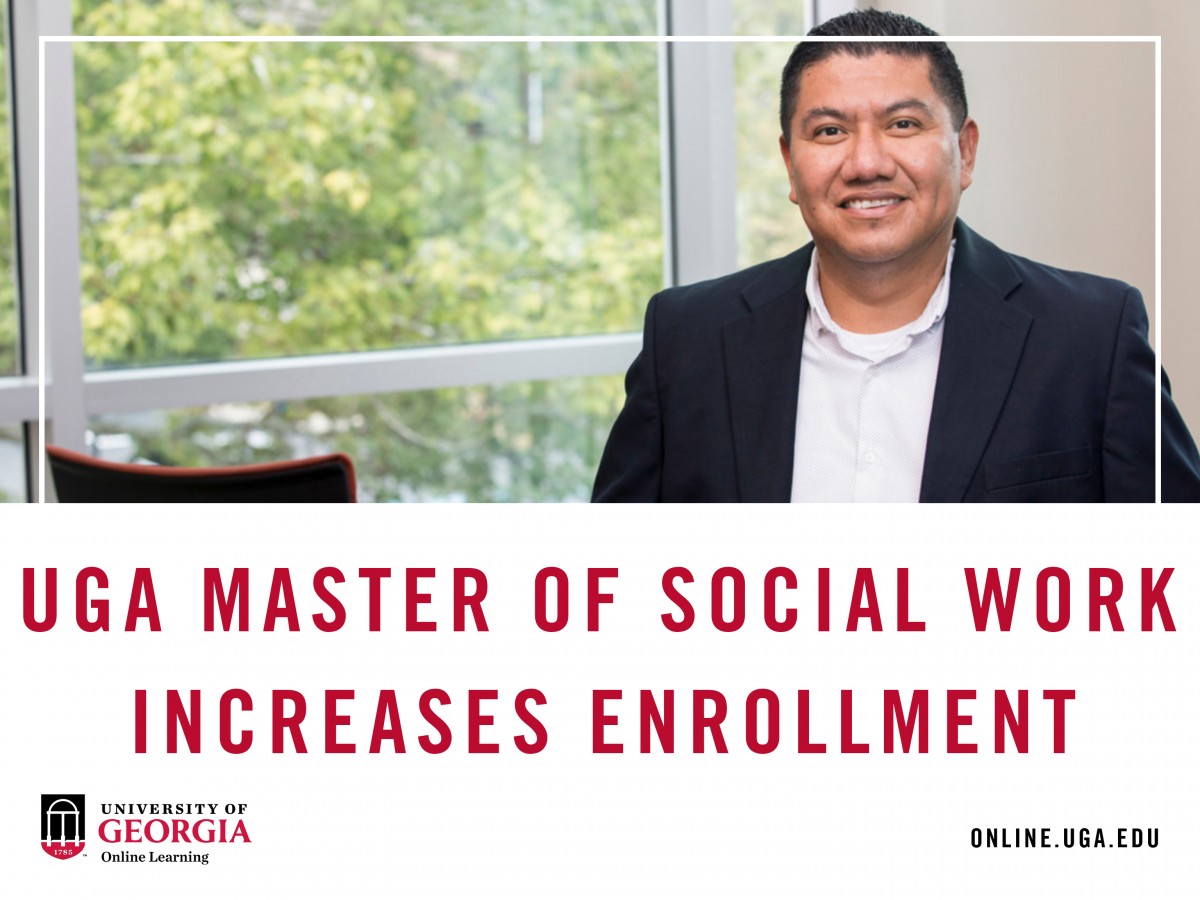UGA Master of Social Work increases reach and enrollment
UGA Master of Social Work increases reach and enrollment
In its first year, the University of Georgia’s School of Social Work Online MSW program has nearly doubled its expected enrollment. The creators of the online program, launched in 2019, hoped to increase access to advanced degrees in social work practice and address service shortages in rural and medically underserved areas in Georgia.
 “We have seen a tremendous level of interest from prospective students throughout Georgia, particularly from rural areas,” said Javier Boyas, director of the master’s degree program at the UGA School of Social Work.
“We have seen a tremendous level of interest from prospective students throughout Georgia, particularly from rural areas,” said Javier Boyas, director of the master’s degree program at the UGA School of Social Work.
“People in rural areas often face tremendous challenges—not enough medical services, lack of broadband, the opioid epidemic, poverty, and isolation—and rural social workers are needed,” said Anna Scheyett, dean and professor at the School of Social Work. Many urban areas also desperately need services, she said, which the online program will help supply.
“The online MSW program can now reach people who are place-bound and can’t come to Athens or Gwinnett, but who have a deep commitment to helping their community,” said Boyas.
According to Boyas, the school aimed for an initial cohort of 25 students for the online degree. However, as prospective students began applying from all corners of the state, the program director pushed to increase capacity.
“Preliminary data suggests that we are meeting an existing need throughout the state, as evidenced by the number of applications we received,” said Boyas.
Applicants have come from a wide variety of professions and experiences, with academically sound backgrounds, said the director. For the first semester in fall 2020, the program received more than twice the applications than it had seats, as students applied from 32 different Georgia counties, including many from underserved rural counties.
“This is the type of richness we envisioned recruiting when we first began this journey,” said Boyas. For the 2021-2022 year, the program will again recruit two cohorts of 25 students, while the school looks at expanding online capacity. The application deadline is February 15, 2021.
Interest in the school’s traditional classroom setting for the master’s degree also has jumped this year. Enrollment at the Athens and Gwinnett campuses contributed to an overall increase of 66% for the entire master’s degree program above the previous year.
The impact of COVID 19, the Black Lives Matter movement, and other recent events also may have influenced the demand for social workers, believes Scheyett.
“Societal challenges have forced us to look at the terrible disparities in our country, and people want to be part of the solution,” she said. “The MSW is a way to gain the skills to do this.”
UGA’s social work graduate program is particularly attuned to addressing disparities, with a curriculum that relates learning to the larger drivers of social stressors. The curriculum framework—which school faculty refer to by the acronym PrOSEAD—ensures that all courses address issues of power, oppression, social justice, evidence-informed practice, advocacy, and diversity.
The increases in enrollment bode well for Georgia, where the need for social workers is particularly acute. In 2015, nearly a third of Georgia’s counties did not have a single licensed social worker practicing in the area, according to Voices for Georgia’s Children. In 2019, the state placed 41st and 46th nationally in the provision of primary and mental health care, respectively, by America’s Health Rankings. Of the state’s 159 counties, the Georgia Department of Community Health designated 141 as primary care health professional shortage areas and 131 as mental health professional shortage areas.
“These factors partially explain why the mental health needs of Georgians often go unmet and thus widen the mental health disparities gap experienced by people of color, people in poverty, and people in rural areas,” said Boyas.
Social workers also provide support in many fields besides health, such as education, the arts, child and youth welfare, and the justice system, to name a few. With such a wide range of specializations, no wonder the employment outlook for the profession is good. The Bureau of Labor Statistics projected that from 2016 to 2026 the number of social workers will increase by 16%—more than double the growth rate projected for all occupations.
“An MSW gives people the knowledge and skills to address these disparities across all levels—from direct practice with individuals to policy change and political action,” said Scheyett. “Social workers are making change across the spectrum.”
For more information, visit the online Master of Social Work program page.
